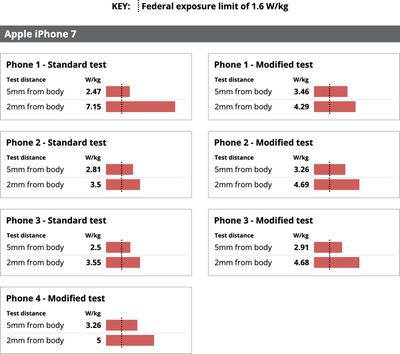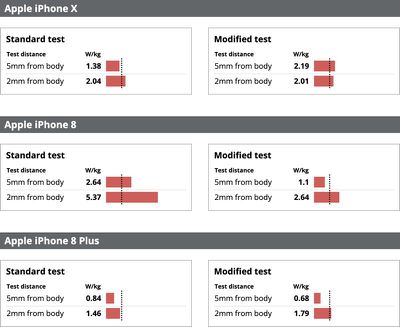The Chicago Tribune recently launched an investigation into the radiofrequency radiation levels output by popular smartphones, and found that some of Apple's iPhones are allegedly emitting radiofrequency radiation that exceeds safety limits.
According to the newspaper, it contracted an accredited lab to test several smartphones according to federal guidelines. iPhones were secured below clear liquid formulated to simulate human tissue while probes measured the radiofrequency radiation the liquid absorbed.

Several iPhones measured over the legal safety limits in the tests, but the worst performer was the iPhone 7. Its radiofrequency radiation exposure was over the legal limit and more than double what Apple reported to federal regulators.
The iPhone X was slightly over limits in some tests, as was the iPhone 8, while the 8 Plus stayed within the legal range. iPhones were tested twice after Apple provided feedback on the testing method. The modified test "added steps intended to activate sensors designed to reduce the phones' power."
In these modified tests, where a reporter held the iPhone to activate the sensors in question, the iPhone 8 was under the 5mm limit, but the iPhone 7 models were not. Apple disputed the results found by The Chicago Tribune and said that the lab did not test the iPhones in the same way that Apple does, though Apple would not specify what was done wrong in the testing. Apple also said the modified testing had been done wrong.

Apple officials declined to be interviewed, and asked The Chicago Tribune to submit questions in writing, which were not responded to ahead of publication. Apple later shared a statement that again said the testing was inaccurate "due to the test setup not being in accordance with procedures necessary to properly assess the iPhone models."
"All iPhone models, including iPhone 7, are fully certified by the FCC and in every other country where iPhone is sold," the statement said. "After careful review and subsequent validation of all iPhone models tested in the (Tribune) report, we confirmed we are in compliance and meet all applicable ... exposure guidelines and limits."
The FCC, meanwhile, said that it is going to be doing its own testing over the next couple of months.
"We take seriously any claims on non-compliance with the RF (radiofrequency) exposure standards and will be obtaining and testing the subject phones for compliance with FCC rules," agency spokesman Neil Grace said.
Smartphones from Samsung, Motorola, and Vivo were also tested, and most of these also demonstrated radiofrequency radiation levels that exceed FCC guidelines in The Chicago Tribune's testing.
Both the FCC and smartphone manufacturers test all new smartphones before they're able to be released to the market, making sure devices comply with exposure standards for radiofrequency radiation. The Chicago Tribune claims that this is problematic because just one phone needs to pass and manufacturers are allowed to select the testing lab.
While tests can be conducted from up to 25mm away, The Chicago Tribune used the distance that manufacturers choose for their own tests. In Apple's case, that's 5mm. A second test was also done at 2mm to simulate the way most people carry their phones.
It's worth noting that testing was done in a way to simulate the worst possible exposure conditions.
The phone was now operating at full power, creating what was essentially a worst-case scenario in terms of radiofrequency radiation exposure. Typically, Moulton said, consumers do not experience exposure like this. But it could happen, he said, in limited situations, such as someone talking continuously in an area with a weak connection.
The Chicago Tribune says that its testing was not meant to rank phone models for safety, and in the limited testing, only 11 models were examined. In many cases, just one device was tested, and even then, the paper says it's not known whether the cellphones found to be above the limits even have the potential to cause harm.
Apple tells customers worried about radiofrequency radiation exposure to use a hands-free option, and on some iPhone models, such as the iPhone 4 and 4s, Apple has recommended carrying the devices at least 10mm away from the body to ensure exposure levels remain at or below tested levels. Apple made a similar suggestion with the iPhone 7 when submitting documentation to the FCC, but allegedly did not go on to inform customers about the 5mm distance recommendation.
The FCC plans to do additional testing on smartphones to follow up, which should give more insight into the safety of smartphones. For more on the testing procedures and the results, The Chicago Tribune's full report goes into much more detail and is well worth reading for those who are concerned.























